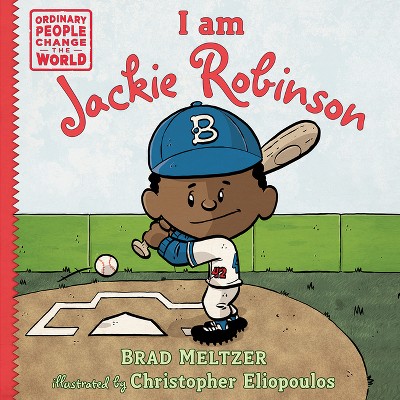Sponsored

Globetrotter - by Mark Jacob & Matthew Jacob (Hardcover)
In Stock
Sponsored
About this item
Highlights
- The Harlem Globetrotters weren't from Harlem, and they didn't start out as globetrotters.
- About the Author: Mark Jacob is the co-author of the eight books about sports, history, and photography.
- 320 Pages
- Sports + Recreation, Basketball
Description
About the Book
The Harlem Globetrotters weren't from Harlem, and they didn't start out as globetrotters. Globetrotter is the fascinating biography of Abe Saperstein, a Jewish immigrant who took an obscure group of Black basketball players from Chicago's South Side, created the Harlem Globetr...Book Synopsis
The Harlem Globetrotters weren't from Harlem, and they didn't start out as globetrotters. Globetrotter is the fascinating biography of Abe Saperstein, a Jewish immigrant who took an obscure group of Black basketball players from Chicago's South Side, created the Harlem Globetrotters, and turned them into a worldwide sensation.
Review Quotes
Globetrotter is an engaging portrait of a contradictory sports dynamo who played a key role in developing professional basketball into the wealthy global brand it is today.
A beautifully written, nuanced portrait of one of America's most interesting, influential, and overlooked sports figures. Globetrotter dazzles with its fine writing and scores over and over again with its impressive research. It's a winner.
Abe Saperstein remains among the most influential figures in sports history, but too few know his name or remarkable story. Globetrotter fixes that in thrilling style, delivering us courtside for a gripping biography of a man whose impact on American athletics, race relations, and flat-out fun remains as vibrant and valuable as ever.
It might be hard to believe now, but there was a time when basketball was a somewhat marginal sport. A key figure in taking it to popular, professional status was Abe Saperstein, best remembered as the owner and promoter of the Harlem Globetrotters team. The Jacob brothers, both experienced sportswriters, set out to tell his story, admitting that the task was made difficult by Saperstein's tendency to embellish, exaggerate, and invent. In fact, it is not even clear when the team was founded, although it was sometime in the late 1920s (and the team was from Chicago, not New York). Saperstein, the son of Jewish immigrants, saw a wealth of talent in the Black community and took his team on a series of grueling cross-country tours, including to the segregated South. It was tough going, but the team, combined with Saperstein's talent for marketing, slowly climbed to the championship level. When the Trotters started doing entertaining tricks at halftime, the spectators loved it. The show became a trademark, and Saperstein developed tactics that turned the game into a dynamic, crowd-pleasing spectacle. He was a tough and often paternalistic boss--and was sometimes criticized for playing up Black minstrel stereotypes--but when Saperstein died in 1966, he left a legacy of breaking down racial barriers and changing the nature of the game. The Jacob brothers provide a fast-paced narrative of an underappreciated game changer.
Short in physical stature but a giant in his time, Abe Saperstein created in Chicago that international sensation called the Harlem Globetrotters. That remains his most notable and influential accomplishment but this was a man of inexhaustible energy and ideas.... His 63 years were filled with so much activity that it is mysteriously astonishing that there has never been a full-blown biography. That surely would have saddened and surprised him, for in his lifetime he was a fabulist of the first rank, creating in the press favorable stories about himself, the Globetrotters and his many other endeavors. That injustice has finally been remedied by brothers Mark and Matthew Jacob in their deeply researched, exquisitely written new book, Globetrotter: How Abe Saperstein Shook Up the World of Sports.
The life of Abe Saperstein is a study of contradictions. Standing five feet, three inches tall, the energetic but diminutive promoter and booking agent founded the Harlem Globetrotters in the late 1920s and barnstormed through the country showcasing his all-Black basketball team, often against white opponents. He was an advocate for the promotion of Black ball players and deemed a racist for exploiting his players by having them perform humorous routines on the court. Saperstein's influence didn't stop with basketball; he was integral to the integration of Black players into major-league baseball, and his Globetrotters were sometimes funded by the State Department to promote U.S. relations abroad during the Cold War. Meticulously researched and written in an easy and entertaining style, Globetrotter provides a lively and honest look at Saperstein's life. Readers will be amazed at the all-star names that he represented or worked with: Wilt Chamberlain, Satchel Paige, and Jesse Owens, to name a few. Even his failed stint as the commissioner of the short-lived American Basketball League (1961-2) left an indelible mark on modern basketball. When Caitlin Clark or Steph Curry launch shots from beyond the three-point line, they can thank Abe Saperstein for introducing it to professional basketball.
This book is as fast-paced and as entertaining as a Globetrotters game! Abe Saperstein played a major role in making pro basketball the worldwide sensation it is today, breaking down racial barriers and piercing the Cold-War Iron Curtain along the way. The story of his amazing forty-year career--which includes all the "gimmicks" he devised, like the 3-pointer--makes for a terrific read.
When Abe Saperstein died in 1966, he was the most well-known, and successful, sports promoter in the world. But today, he has been largely forgotten. Mark Jacob and Matthew Jacob's Globetrotter will hopefully correct that wrong. In a meticulously-researched book, they bring to life this complex man-- from his unparalleled marketing genius to his complicated record on race. It is a fascinating story about one of the most important men in sports history, with lessons that still resonate today about race and sports in America.
About the Author
Mark Jacob is the co-author of the eight books about sports, history, and photography. He is former metro editor of the Chicago Tribune and created the newspaper's popular "10 Things You Might Not Know" history feature. Jacob's articles have been published in Library Quarterly, Chicago Reader, Chicago magazine and Chicago History magazine. He is a former adjunct professor at Northwestern University.
Matthew Jacob is the co-author of What the Great Ate: A Curious History of Food and Fame with his brother Mark. He started his career as a journalist, working as a sportswriter and city council reporter, receiving awards from the Arkansas Press Association. Jacob is a member of the Society for American Baseball Research and has written for such outlets as the Boston Globe, Detroit Free Press, Los Angeles Times, and USA Today.Shipping details
Return details
Frequently bought together


Trending Non-Fiction





Discover more options










